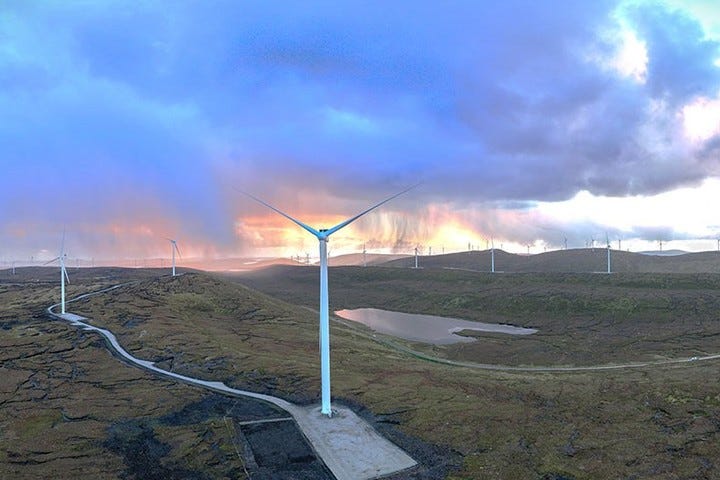The Climate Conscious Voters Guide to the UK Election
Here's a quick guide to the UK election on Thursday July 4th 2024 for voters with climate as the key issue
Hello all. This post is focused on the UK national election, which is coming up in a couple of weeks (Thursday July 4th 2024) and is my personal suggestion of how to think about voting if your top concern is climate change.
(Image Viking Wind Farm, in Shetlands, UK. Source)
First off, you need to note that my view on where to vote very much echoes that of writer and activist, Rebecca Solnit, “I Think of Voting as a Chess Move, Not a Valentine.” In each an every election you are seeking the move that brings us closer to action. I’ve written much more about this here, if you want more on my thinking, but the key is that we need to elect politicians and governments who will act as the scale of what is needed is beyond any individual action we can take. Let me give an example from the US of what having a government what will act can do - the 180 flipping of a government agency that did R&D into coal, oil and gas use into one doing R&D into the opposite:
Previously, the Office of Fossil Energy’s primary function was to support research into oil, gas, and coal extraction and use. Wilcox flipped the mission on its head, reorganizing the department into one that would support research, development, and deployment of solutions that reduced dependency on those resources and minimized their environmental impacts. By July, she had codified that mission in a new name — the Office of Fossil Energy and Carbon Management.
For non-UK readers, note that the UK uses a first-past-the-post Parliamentary system; so people vote for a politician in thier area (called a constituency) and the candidate who gets the most votes in that area is elected to the parliament to represent that area (called an MP, Member of Parliament). That MP is normally a member of a political party (but not always) and then the party with a majority of MPs get to decide who the leader of the parliament will be (normally the leader of the party) and they become the Prime Minister and so lead the government.
So on to the UK and there is a bunch of positive climate news coming out of the UK!
Thousands march in London to urge leaders to tackle wildlife crisis
And the big one!! Future impact of proposed fossil fuel projects must be assessed, UK court rules
Andrew Boswell, a retired computer scientist and climate activist who has filed a number of lawsuits challenging the impact of road building on the climate, also welcomed the judgement. “It is an important signal to fossil fuel extractors, polluting industries and road developers that they can no longer get away with underplaying how much they are destabilising the climate system. If the next government is serious about climate change, it must work on strengthening the law to close all such loopholes.”
This happens because people care, they act and the laws give them scope for that action. If we get a government who is an anti-science one, they can try to change the laws and reverse this. So action and politics combined become key.
So here’s my guide:
See where the election is expected to fall in your constituency. For this I recommend looking at the three main tactical voting websites; tacticalvote.co.uk, tactical.vote and GetVoting.org.
Based on the above results you need to see who you think can win and (key!) who might come second. Who needs to win (ideally) in order is:
Green Party - The most climate-action party. They are not going to win power, but the more MPs they get, the more they can pressure the government to action.
Labour - Polls show they are going to win - and by a lot - and while they have become much more timid on climate, they do accept the reality of climate change and they have some policies that move us in the right direction.
Liberal Democrats - Most likely to become the ‘official’ opposition and, not unlike Labour, they do accept the reality of climate change and they have some policies that move us in the right direction.
Who your choice needs to ensure loses is:
Conservative - While not as bad as some right-wing parties globally, very little real action and a host of really bad decisions recently plus the rightward lurch they are undergoing means it will get worse.
Reform - The literal worst case on climate; deny the reality of climate change and want to scrap the inadequate net zero targets we have.
So weight up who can win vs who is coming second and make the choice. To give some examples:
Bristol North East - Straight Labour vs Conservative battle. Vote Labour as other parties have got no chance here and it's close between Labour & Conservative.
Bristol Central - Labour vs Green battle, with zero chance of a Conservative or Reform win. So Go Green here.
Clacton - A seat Reform looks to win, so Labour is the best chance to stop them.
Waveney Valley - Interestingly the Greens are surging here vs Reform, so go Green.
Hope this helps! Fingers crossed for 4th July!


